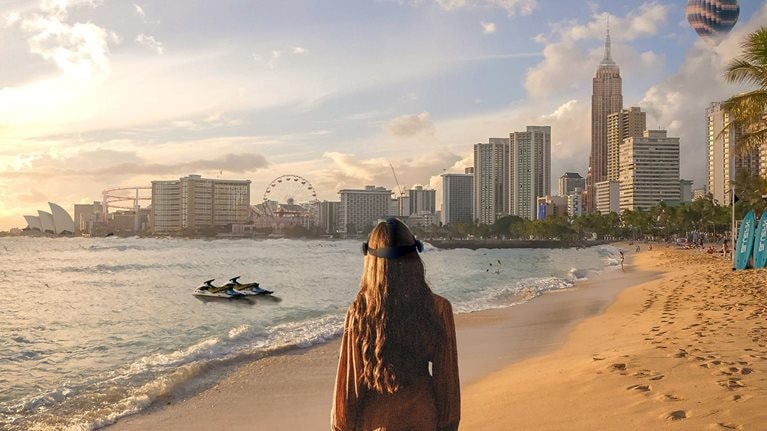Francis Davidson, Sonder’s cofounder and CEO, never thought he’d start a company. “I didn’t know I had the entrepreneurial gene in me,” he says. But subletting his student apartment one summer while attending Montreal’s McGill University eventually led him to manage a portfolio of short-term rental spaces—often handling booking, guest services, and housekeeping himself. In 2014, with his accommodations holdings rapidly expanding, Davidson incorporated the business.
Sonder (rhymes with “wander”) attempts to combine the reliability and sheen of a luxe international hotel with a tech-forward vibe. The company has so far focused on urban markets, but Davidson harbors grand ambitions. “We hope to make a dent in resorts, vacation destinations, and every other kind of accommodation,” he says. “The opportunity is to revolutionize hospitality, full stop.” Sonder went public on Nasdaq in early 2022 and now does business in more than 40 cities in ten countries.
In this installment of Travel Disruptors, Davidson spoke with McKinsey’s Ryan Mann about learning from legendary hoteliers, using technology to transform the guest experience, and creating brands that draw on travel’s narrative power. Their conversation has been edited for length and clarity.
McKinsey: What’s the difference between what Sonder provides and what you’d see from a traditional hotel chain or a short-term rental company?
Francis Davidson: Design is one differentiator. The main difference from a big-box, chain hotel room is that Sonder makes you feel like you’re in a boutique accommodation. We’ve taken great inspiration from some of the best boutique hotels and most beautiful, well-architected buildings. You’ll see beautiful art on the walls, sculptural furniture, and interesting colors and patterns. Our locations also have a sense of place, speaking to the design and architecture typical of their city or country.
The difference from a short-term rental—a mom-and-pop–run accommodation—is that we offer standards of consistency and quality that you typically don’t get within that category. So you’ll see crisp white linen, stacked towels, and great soaps and shampoos.
Tech is another area that differentiates us. Interactions with our guests have been modernized. We have a guest app that allows you to get service at your fingertips 24/7. You can request an early check-in or late check-out on the app. You can call an Uber from the app when you’re at the airport and the app will automatically load your Sonder destination. There are a variety of integrations that make our service seamless, high quality, and consistent.
We power the business using tech to elevate the hospitality experience while also putting that experience within reach of the majority of consumers. We’ve leveraged technology in ways that let us offer our experiences at really affordable price points. When you bring these things together—a boutique accommodation, elevated design, standards of quality and consistency, all at a price point that’s affordable—it makes for a compelling value proposition for the guest.
McKinsey: When you think about potential new properties, how do you identify them? What are you looking for in terms of location, style, and lease terms?
Francis Davidson: The ambition of Sonder is to become the leading hospitality company globally. But there are key questions as we expand. What is the right sequencing? Which markets should we launch in first? Which kinds of properties should we look for that will allow us to scale as efficiently as possible?
Typically, we launch in markets that are near each other, because the vast majority of travel isn’t over long distances. People tend to travel more regionally than they do far away. This expansion pattern also means we have operations that we can leverage nearby. Operating efficiency is really important in delivering our mission.
When it comes to specific assets, we think a lot about design and architecture. All our decisions pass through an internal review committee made up of various functions across the company. Another important part of the criteria is our economic threshold. As a business, we are very much focused on capital efficiency, and we have certain hurdles when it comes to payback periods, margins, and the lifetime value of a deal. We have robust underwriting, with hurdles that we must clear in order to move forward with an asset.

The future of hotels: Customized experiences, sustainable practices
When a deal has compelling unit economics, with a guest experience that aligns with our brand, in a market that makes logical sense given our existing map, then we get really excited about that growth opportunity.
McKinsey: Sonder is a tech-led hospitality company. How is technology shaping next-generation hospitality experiences for travelers?
Francis Davidson: When it comes to technology that modernizes the way a hotel is operated, there’s immense white space. The way hotels have operated for the last 40 years hasn’t changed a ton.
For example, property management systems today are still, by and large, on-premises pieces of software. There hasn’t been a shift to the cloud. There are a lot of things that are still done manually by hospitality workers—whether it’s check-in or handling guest requests—that could be streamlined and automated for the benefit of the guests. You shouldn’t need a labor-intensive process just to get someone through the door or to answer a basic request. In the traditional hospitality world, either you do things face-to-face by going down to the front desk or you pick up a physical phone in the room and push something on that keypad that will connect you to a live agent. We’ve tried to transpose these interactions to the modern era by automating them and handling them through text messaging on our app. You should be able to use your own phone to unlock your door and to send requests. Standing in a check-in line and picking up the room phone to order room service feel like dated parts of the hospitality experience. You would expect it to be far more modern by now.
This is something that’s especially important to the customer base we focus on—primarily millennials and Gen Z, who are going to be the majority of travelers shortly. We build our guest experience for this digitally native generation that much prefers the frictionless experience you get by having instantaneous, tech-driven service and design-forward spaces.
McKinsey: Are you seeing more growth and interest recently from business travelers or from leisure travelers?
Francis Davidson: Sonder’s customer base has historically been focused on leisure. But in 2021, we launched our business travel program, and we’ve seen really strong growth so far. With economic uncertainty, most businesses are thinking, “Is there a way I could be more efficient on my travel dollar spend?” One segment that works well for us on the business travel side is extended trips. Think about a film crew on a long shoot, for example. It can be challenging to stay in a hotel room. Our apartment-style product fits particularly well: you have a washer and dryer and a kitchen, so you can do your own laundry and cook your own meals.
McKinsey: How do you address the typically lower-margin, higher-cost structure of hospitality?
Francis Davidson: One element that helps us be substantially more efficient is the physical footprint of our buildings. Often, hotels have lobbies that are way too large, which means there’s too much space that’s used unproductively. We tend to have much smaller lobbies at Sonder.
We also use self-serve approaches to operate more efficiently and then pass those savings on to guests. For instance, when guests arrive early or want to check out late, they need a place to store their luggage. Instead of doing that with a front-desk agent, we have well-designed luggage lockers. There’s another self-serve space where you can find extra towels and toilet paper. All of this is presented to the guest through our digital channels so that we point our guests toward these self-serve pieces of infrastructure that exist within our buildings.
We also outsource to high-quality food and beverage operators. We know that running a good restaurant is challenging. Most midscale and even upscale hotels struggle to do that well. What we do instead is find local food and beverage operators and then integrate with them to make sure that they can provide their experience to our guests in a seamless fashion, without us having to take on that operational burden.
McKinsey: Design is a critical component for Sonder. How do you think about the role of design in travel? How do you use it to differentiate your brand?
Francis Davidson: Design is incredibly important for the hospitality business. There’s been a generational shift, maybe because of the rise of Instagram, and we see that design is now one of the major drivers of decision making for next-generation travelers. There’s a sense of pride that they get when they stay at a really well-designed place. They’re going to take a photo. Maybe they’re going to post it online.
One of my favorite books, Alain de Botton’s The Architecture of Happiness,1 goes into great detail about how well-architected buildings could lead to a more fulfilled life. We’ve tried to take lessons from various architects, industrial designers, and artists so that we can bring their ideas to hospitality outlets that democratize access and are available to the many. This follows the trend set by the midcentury modern movement, when designers such as Charles and Ray Eames were saying that design should be within reach for all.
McKinsey: At McKinsey, we talk a lot about how, over the past couple of years, travel was taken away from people—and that made them appreciate it even more. How do you think the pandemic has changed hospitality?
Francis Davidson: The pandemic has accelerated the adoption of new guest-facing technology by, probably, a decade in the course of a couple of years. Things like contactless check-in, mobile keys, and housekeeping that’s by request only—these have come about much more rapidly as a result of the pandemic. Those things are also aligned with our general approach. We think that this was the inevitable path that hospitality was headed toward; it’s just been accelerated.
The pandemic has accelerated the adoption of new guest-facing technology by, probably, a decade in the course of a couple of years.
McKinsey: What’s your vision of what the future of travel will look like? What are future travelers going to want from their hospitality experiences?
Francis Davidson: I think what you’re going to see is extremely aspirational hospitality being available to the many. There’s no reason why a beautiful space should cost four or five times more than a humdrum space. With the help of technology, there’s no reason why service shouldn’t be instantaneous, 24/7, and just as good as service at the best five-star hotels—but at a three-star price point. I think what we’re going to see is an upleveling of the quality of the customer’s experience as the industry gets much more efficient.
I also think we’re going to see the rise of very powerful consumer travel brands. The opportunity for storytelling in travel is enormous. Almost everyone, when they take time off, the first thing they think about is “Where can I go? How can I travel and explore the world?” It’s something that pretty much everyone loves to do. But the most powerful brands that exist in the world today are brands that sell things that don’t have anywhere close to the strong narrative power that travel has. I’m hoping that over the next couple of decades, we’re going to see the emergence of many superbrands within travel.
McKinsey: What’s been your most unexpected lesson so far?
Francis Davidson: Initially, we were going to do everything our way and start from scratch. Then we realized that, in many instances, we were trying to reinvent the wheel. We could do a better service to the future of hospitality by adopting existing best practices when a system has been optimized, so that we can concentrate on things that we actually want to change.
I read the biography of Kemmons Wilson, the founder of Holiday Inn. There are immense lessons to be learned from it. He built an amazing all-American company that then became an international success. There are other examples of people—Conrad Hilton, the Marriott family—who have done extraordinary things in the world of hospitality that we ought to study and understand. It’s about being humble and finding a delicate balance between respecting the status quo and, at the same time, wanting to improve and disrupt it.
McKinsey: What are your favorite moments on the job?
Francis Davidson: My favorite moments are the times when we’ve faced an immense crisis and managed to pull the team together and get through it. Sonder shouldn’t really be around now after the pandemic. We’re a hypergrowth company that is dependent on travel demand, which completely evaporated overnight. That was really hard, and not all companies in the space made it. We found a way to keep our properties occupied by pivoting to extended stays of 14 days or more, which provided the vast majority of our revenue within a few weeks. It was an extremely intense project that we pulled off—landing pages, marketing, pricing models, sales, new distribution channels. All of that happened within a matter of days. We managed to launch this in March of 2020, within the first few weeks of the pandemic. It saved the business.
I think very few people realize the upside of a crisis when it’s happening, because it’s so scary. It could be demotivating in that moment. But when it works out, and you look at it from the other side, it generates immense pride.


